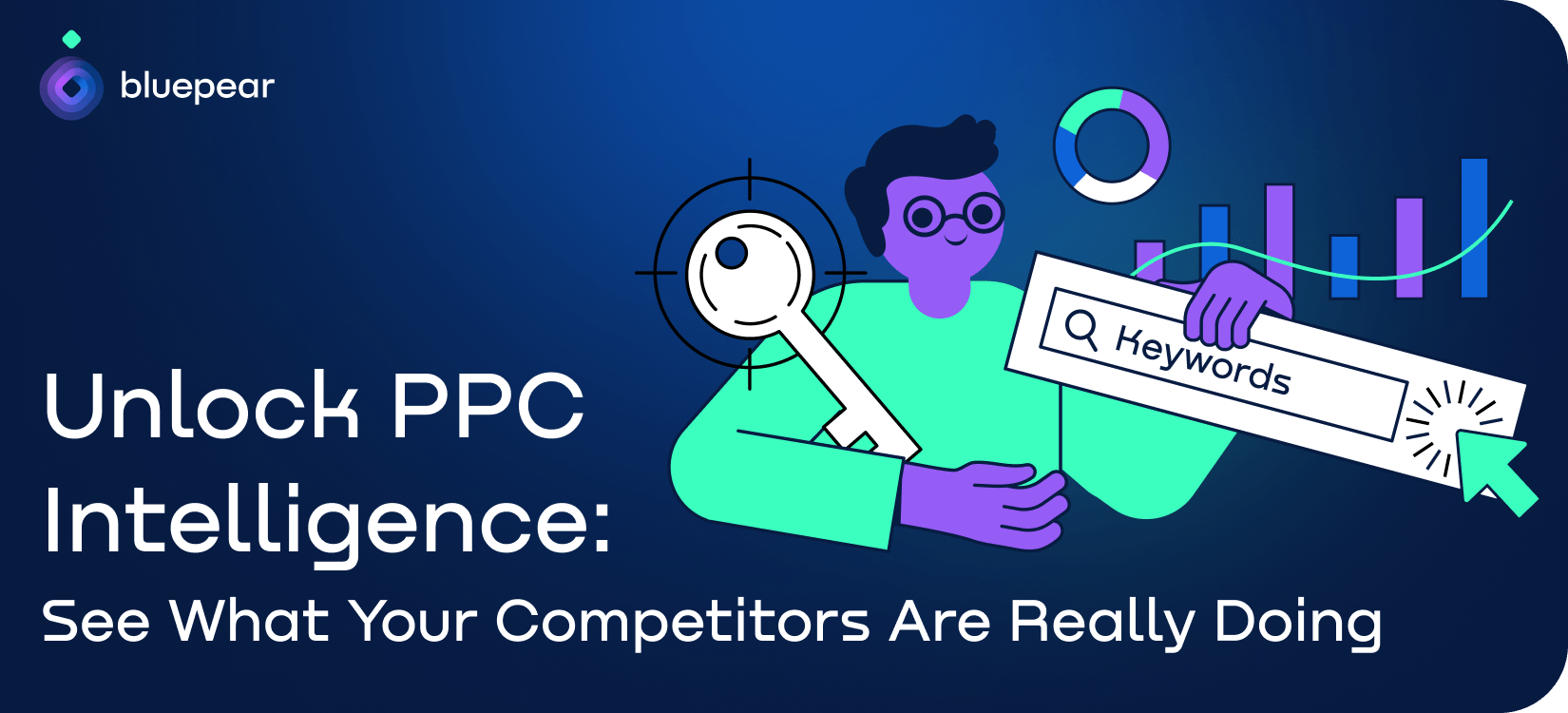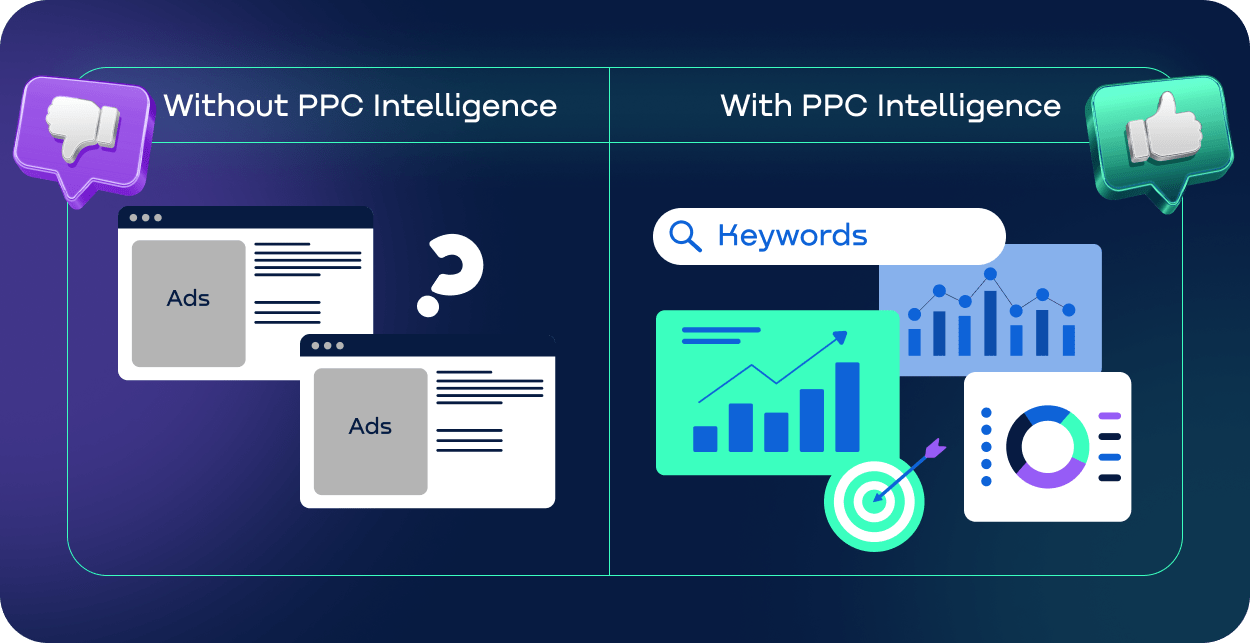
Contents
Unlocking PPC Intelligence: How to Outperform Your Competitors with Smarter Data
In today’s competitive digital landscape, staying ahead in pay-per-click (PPC) advertising takes more than gut feeling — it takes smart data. PPC intelligence gives marketers the edge by turning competitor insights into better decisions, sharper ads, and smarter bidding. Whether you’re tweaking copy or adjusting spend, the right intel helps you win. This article breaks down how PPC intelligence works — and how to use it to beat the competition.
Why PPC Intelligence is a Game-Changer for Modern Advertisers
PPC intelligence is transforming how marketers approach their ad campaigns. At its core, PPC intelligence refers to gathering and analyzing data related to competitor strategies to improve your own paid search efforts. For modern advertisers, it is a game-changer because it allows businesses to base their decisions on data, not guesswork.
Without PPC intelligence, brands often rely on intuition or outdated strategies that may no longer be effective.
However, by using PPC competitive intelligence, businesses gain real-time insights into how their competitors operate:
• Keyword choices — what terms they’re targeting and ranking for
• Ad copy — how they craft messages to attract clicks
• Bidding strategies — how aggressively they compete for top spots
• Budget allocation — where and how much they’re spending
This gives a clearer picture of what works, and more importantly, what doesn't.
By using search intelligence solutions, marketers can avoid common pitfalls and create targeted, high-performance campaigns that drive real results.
Read more about paid search intelligence to further enhance your marketing strategy.
From Data to Decisions: How PPC Intelligence Works
Understanding how PPC intelligence tools function is crucial for maximizing their potential. Here’s a step-by-step guide to how these tools help streamline and enhance your PPC strategy: Data Collection: PPC intelligence tools gather vast amounts of data from various sources, including search engines, competitor ads, and user interactions. This information includes keywords, ad copy, bidding strategies, and competitor activity across multiple devices and regions.
1. Competitor Monitoring: These tools track your competitors’ campaigns, giving you a comprehensive view of their strategies. For example, PPC competitor tracking allows you to monitor how your competitors are bidding on certain keywords, their ad placements, and changes they make to their ad copy or targeting.
2. PPC Data Analysis: After collecting data, the tools analyze it to uncover trends and insights. This can include identifying the most profitable keywords, discovering gaps in competitors’ strategies, and understanding which ad variations perform best.
3. Actionable Insights: The ultimate goal is to turn raw data into actionable strategies. Armed with insights on competitor campaigns and market trends, you can adjust your bids, fine-tune ad copy, and refine your targeting to ensure better campaign performance.
By utilizing PPC intelligence tools, you can ensure that every decision you make is backed by data, helping you stay ahead of the competition.
And with Bluepear, you get all of this in one place — from powerful data collection to smart competitor tracking and actionable insights — making it a smart, all-in-one solution for brands that want to lead, not follow.
PPC Competitive Intelligence: What Your Competitors Don’t Want You to Know
A key aspect of PPC intelligence is PPC competitive intelligence — the practice of analyzing your competitors’ paid search campaigns to uncover their strengths and weaknesses. Done right, it’s not just about spying — it’s about using competitive PPC analysis to build smarter campaigns that outperform the market. This kind of insight gives you a clear edge.
Here’s how digging into PPC competitive intelligence can benefit your business:
• Spotting Gaps: By consistently running PPC competitor tracking, you can identify keyword opportunities your rivals are missing. Maybe they’re underbidding on a high-intent term, or ignoring a valuable niche. That’s your cue to swoop in and take the lead.
• Learning from Ad Copy: Studying competitors’ ad messaging helps uncover patterns and hooks that work. With the right search intelligence solution, you can quickly see which creatives are getting clicks — and which ones are falling flat — giving you a major leg up when writing your own ads.
• Performance Benchmarking: With competitive PPC analysis, you can benchmark performance across CTRs, CPCs, impression share, and more. This makes it easier to see whether you’re winning the auction or getting priced out — and what changes you need to make to stay in the game.
To go deeper into this strategy, explore our guide on search ad monitoring and how it helps uncover hidden competitor tactics.
Visualizing PPC Intelligence: Data Dashboards, Alerts & Insights

One of the biggest advantages of modern tools is the way they turn raw numbers into clear visuals. From custom dashboards to smart alerts, a good search intelligence solution keeps you informed without overwhelming you. Here’s what to look for:
• Customizable Dashboards: These let you break down every layer of your PPC campaigns — and your competitors’. Whether you're focused on PPC data analysis or tracking share of voice, these dashboards help you see the full picture at a glance.
• Real-Time Alerts: Changes in keyword rankings, new creatives, or sudden spend surges from competitors? You’ll know about them right away. Combined with PPC competitor tracking, these alerts mean you’re never caught off guard.
• Actionable Insights: The best dashboards don’t just show you what’s happening — they help you understand why. With robust PPC data analysis baked in, you can figure out exactly how to adjust your campaigns based on what your rivals are doing right (or wrong).
To explore how these tools deliver strategic visibility, check out our guide on paid search monitoring.
Bluepear makes it easy to understand complex PPC data through intuitive dashboards, smart alerts, and real-time insights that don’t require a data science degree.
Choosing the Right PPC Intelligence Tool: What to Look For
When selecting a PPC intelligence tool, it’s important to find a solution that aligns with your marketing goals and offers deep PPC competitive intelligence. A good tool should not only surface basic data, but also empower competitive PPC analysis that helps you make smarter, faster decisions. Here’s what to consider:
Coverage: Ensure the tool provides comprehensive coverage of key markets, devices, and keywords relevant to your business. The wider the coverage, the more valuable the insights — especially when you’re relying on search intelligence solutions to spot opportunities before your competitors do.
Integration: Choose a tool that integrates easily with your existing PPC platforms (Google Ads, Bing, etc.) and analytics tools (Google Analytics, etc.) for streamlined data management. The best search intelligence solutions don’t just collect data — they connect the dots across your entire ad stack.
Ease of Use: The tool should have an intuitive interface that allows you to quickly analyze competitor data and draw actionable insights without steep learning curves. Great UX becomes a real advantage when you’re deep into PPC competitor tracking and don’t have time to wrestle with complex dashboards.
Real-Time Data: For effective decision-making, your PPC intelligence tool should provide real-time insights. This is especially important when you’re actively involved in PPC competitor tracking and need to adjust your bidding strategies or creatives on the fly.
Custom Alerts: Alerts can notify you about changes in your competitors’ campaigns, allowing you to stay ahead and adjust your own strategies accordingly. This kind of responsiveness is key in any competitive PPC analysis, where timing often makes the difference between leading and lagging behind.
By carefully choosing the right tool — ideally one built with PPC competitive intelligence at its core — you can elevate your PPC campaigns and gain a measurable competitive advantage.
Final Thoughts: From Manual Guesswork to Data-Powered Campaigns
In the world of PPC advertising, relying on manual guesswork is a thing of the past. Brands that continue to operate without PPC intelligence risk being outperformed by competitors who leverage the power of PPC competitive intelligence.
By integrating PPC intelligence into your advertising strategy, you gain access to data-driven insights that enable smarter decisions, optimized bids, and improved ad performance. PPC data analysis provides the clarity needed to refine your approach continuously, making your campaigns more effective and profitable.
If you’re ready to move from uncertainty to data-backed confidence in your PPC campaigns, it’s time to embrace PPC intelligence.

